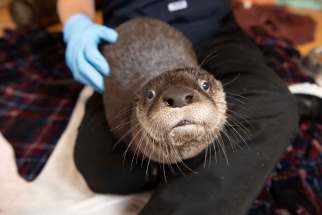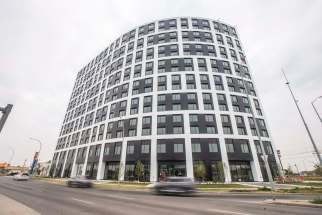Reconciliation minister attempts to make peace
Read this article for free:
or
Already have an account? Log in here »
To continue reading, please subscribe:
Monthly Digital Subscription
$0 for the first 4 weeks*
- Enjoy unlimited reading on winnipegfreepress.com
- Read the E-Edition, our digital replica newspaper
- Access News Break, our award-winning app
- Play interactive puzzles
*No charge for 4 weeks then price increases to the regular rate of $19.00 plus GST every four weeks. Offer available to new and qualified returning subscribers only. Cancel any time.
Monthly Digital Subscription
$4.75/week*
- Enjoy unlimited reading on winnipegfreepress.com
- Read the E-Edition, our digital replica newspaper
- Access News Break, our award-winning app
- Play interactive puzzles
*Billed as $19 plus GST every four weeks. Cancel any time.
To continue reading, please subscribe:
Add Free Press access to your Brandon Sun subscription for only an additional
$1 for the first 4 weeks*
*Your next subscription payment will increase by $1.00 and you will be charged $16.99 plus GST for four weeks. After four weeks, your payment will increase to $23.99 plus GST every four weeks.
Read unlimited articles for free today:
or
Already have an account? Log in here »
Hey there, time traveller!
This article was published 04/08/2021 (1606 days ago), so information in it may no longer be current.
In less than three weeks, Manitoba’s new Indigenous reconciliation minister went from describing residential schools as well-intentioned training centres to seeing them as an act of genocide.
Since the day he was sworn in (July 15), and immediately called out for saying the stewards of residential schools had good intentions, Alan Lagimodiere says he’s been on an intense, and at times overwhelming, listening and learning journey.
On Tuesday, he referred to the establishment of Indigenous residential schools as “genocide,” at a 150th anniversary event for the signing of Treaty 1.
“I did say it was genocide,” Lagimodiere repeated Wednesday.
“It wasn’t just cultural genocide,” he told reporters taking part in a teleconference to announce the province’s $500,000 contribution toward a Chief Peguis statue on the grounds of the Manitoba legislature.
“They weren’t just attempting to erase the culture,” said the minister of Indigenous reconciliation and northern relations, who has Métis roots.

Canada’s first prime minister, Sir John A. Macdonald, supported residential schools and assimilation of Indigenous children, he said. “His plan was to eliminate Indigenous people from Canada and that, to me, is genocide.”
Lagimodiere wouldn’t comment on what he thinks should happen with local monuments to Macdonald, saying it’s a discussion he’d need to have with Indigenous leaders. As for the Chief Peguis statue, an independent committee will choose the design and the location, after the request for qualifications competition closes Oct. 31.
The minister didn’t offer any updates for the statues of Queen Victoria and Queen Elizabeth II toppled at the Manitoba legislature July 1, after the discovery of hundreds of unmarked graves at former residential school sites in Western Canada.
Lagimodiere, who issued an apology for his initial comments July 16, said the words of survivors and descendants moved him during his subsequent 12-community tour.
“I was very overwhelmed by some of the comments, especially the elders and survivors from the residential schools — the tremendous hardships they endured and the stories about how residential schools continue to impact the survivors and the Indigenous people who lost relatives,” he said.
“We need to move forward, acknowledging how deeply wrong some of those decisions made by our past elders were. We need to acknowledge the serious impacts those decisions had, not only on Indigenous population but all Canadians.”
“I was very overwhelmed by some of the comments, especially the elders and survivors from the residential schools– the tremendous hardships they endured and the stories about how residential schools continue to impact the survivors and the Indigenous people who lost relatives.” – Alan Lagimodiere
In June, a motion by MP Leah Gazan (NDP, Winnipeg Centre) in the House of Commons calling on the federal government to recognize the residential school experience as genocide was rejected. She’s waiting to see if Lagimodiere’s actions support his words.
“It’s one thing to apologize. It’s another another thing to demonstrate that apology in action. So I test the sincerity of an apology by action. I guess I’ll have to see how he does moving forward,” she said Wednesday.
Gerry Shingoose, who spent nine years suffering abuse in the residential school system, said she was hurt when Lagimodiere initially described them as places to teach children skills.
“I don’t trust his current statement because his initial statement was very insulting and degrading, as a residential school survivor,” Shingoose said. “Action is needed from him. He acknowledges genocide — what is he going to do about it?”
On Wednesday, Lagimodiere defended the actions of NDP Leader Wab Kinew, who interrupted his first news conference as Indigenous reconciliation minister July 15.

Lagimodiere didn’t describe the encounter — during which Kinew challenged the new minister’s initial statements on residential schools — as “bullying,” as the Progressive Conservative party caucus suggested in a social media post since deleted.
“Mr. Kinew has his role in government and his role as a witness for the Truth and Reconciliation Commission (of Canada),” the minister said. “He did what an Anishinaabe warrior should do if there’s concerns about someone’s statements concerning the Truth and Reconciliation Commission.”
Lagimodiere said he began researching his own Métis background in the late 1970s with an uncle who was a family elder and a knowledge keeper.
“We started to do extensive research as to where our family came from… (and) how did we end up where we are today,” he said. “I was saddened to see in our family tree records of marriages to individuals identified as, I remember, ‘Sarah: Indian.’
“I haven’t to this day been able to find out who she was or her background. It’s a sad testament as to how we used to record information in the past.”
Such data is crucial for reconciliation, Lagimodiere said. “It’s difficult to know the direction we’re heading without knowing where we come from.”
carol.sanders@freepress.mb.ca

Carol Sanders
Legislature reporter
Carol Sanders is a reporter at the Free Press legislature bureau. The former general assignment reporter and copy editor joined the paper in 1997. Read more about Carol.
Every piece of reporting Carol produces is reviewed by an editing team before it is posted online or published in print — part of the Free Press‘s tradition, since 1872, of producing reliable independent journalism. Read more about Free Press’s history and mandate, and learn how our newsroom operates.
Our newsroom depends on a growing audience of readers to power our journalism. If you are not a paid reader, please consider becoming a subscriber.
Our newsroom depends on its audience of readers to power our journalism. Thank you for your support.
History
Updated on Wednesday, August 4, 2021 5:33 PM CDT: Fixes typo







